Unlock comprehensive insights into your health and aging with Thailand’s first epigenetics solution. Our advanced testing reveals crucial details about your cellular health, biological aging, and potential disease risks, empowering you to make informed lifestyle decisions for your well-being.
Assess Aging Progress
Lifestyle Optimizations
Personalized Interventions
Installments payment available:
Not just a study of your genes and heredity, Epigenetics delves into how cells regulate gene activity, influenced by external factors like your environment, diet, and lifestyle.
Chronological age doesn't reflect well-being, but Epigenetic Changes reveal your "Biological Age" based on your cell health and DNA instructions, offering a true measure of your overall health.
Great news: Your Biological Age is Reversible. Epigenetic tests inform lifestyle adjustments and risk reduction for diseases. They offer health insights and will play a vital role in making people live longer.
1,200,000 DNA locations
DNA Methylation insights
AI-Powered Health Analytics
We embrace being solution-oriented after delivering your test result. Our free 30-minute doctor consultation service will provide you with a clear understanding of your result and personalized recommendations on your treatment plan.
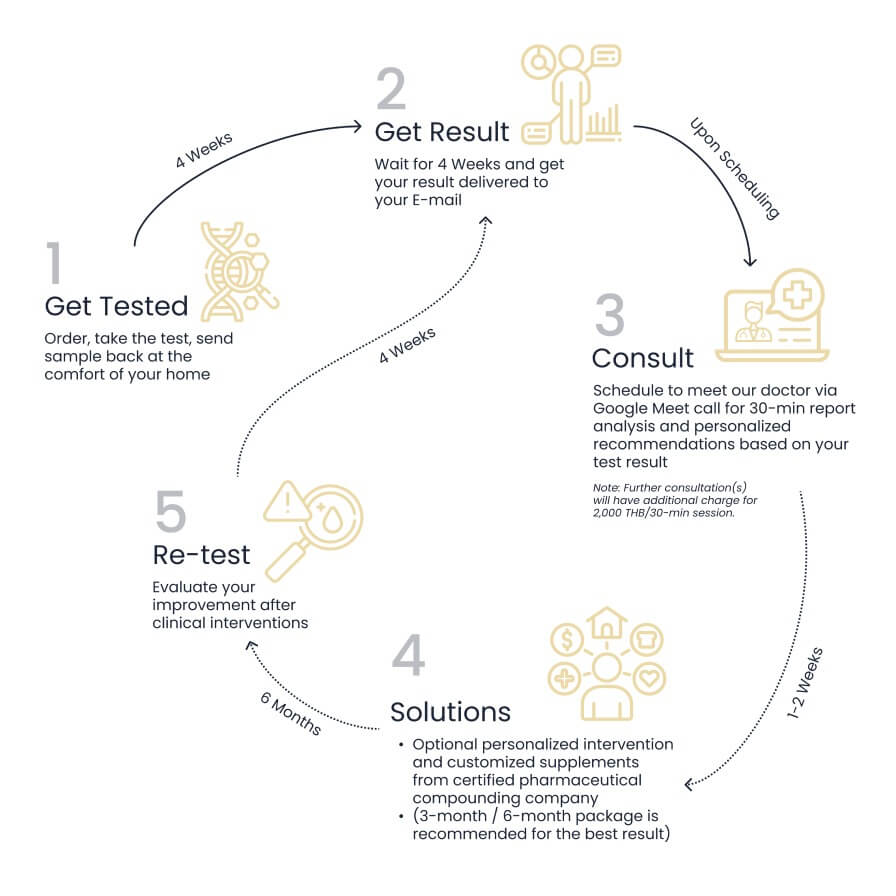
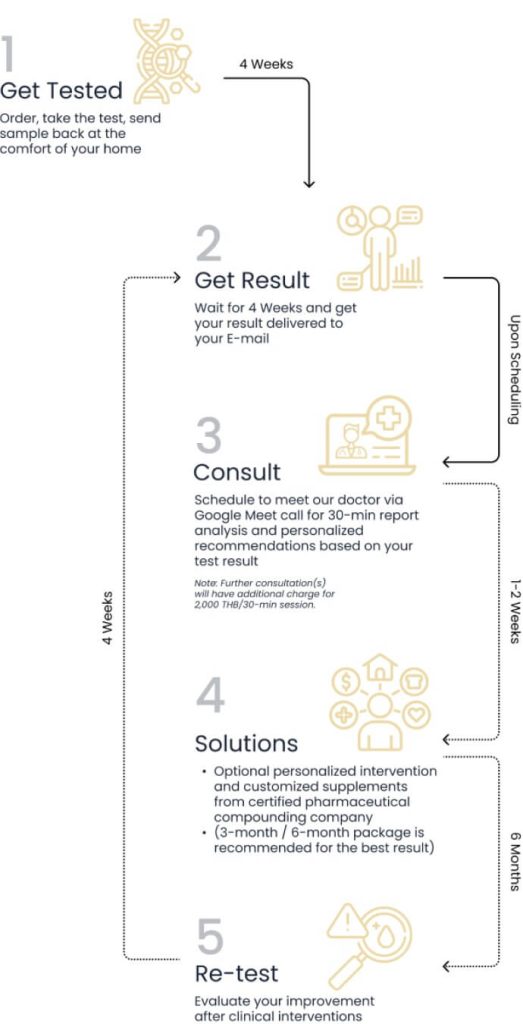
Our precision medicine uses epigenetics to recommend monthly personalized supplements, promoting good health and reducing disease risk effectively and sustainably.
Focuses on biological and immune age, pace, and telomere length improvement
Focuses on mitotic clock, immune age, and telomere length improvement
Focuses on preventing and minimizing symptoms of non-communicable diseases
You can choose to order the test alone for now and then add our Personalized Solutions at any time after receiving your test results.
Know your DNA methylation status and indicators within 4 weeks.
30-min doctor guidance for lifestyle interventions and suggestions for healthy habits.
Optional personalized clinical interventions and supplements with certified pharma compounding company
Self collect your dry blood spot sample and send to our lab.
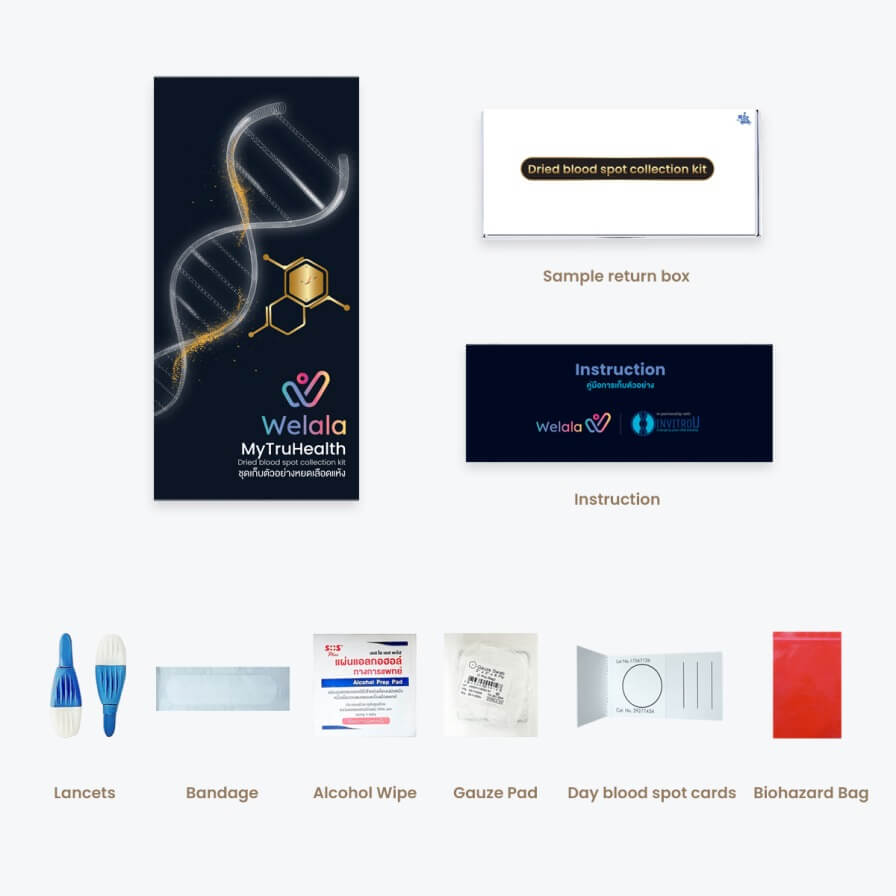



A common type of epigenetic change is called DNA Methylation which occurs when a methyl group is added to a specific location of our DNA. This can turn off genes and prevent them from being expressed.
Our Epigenetic solution – MyTruHealth examines the positioning and quantity of methyl groups on your DNA, providing valuable insights on alterations affecting your gene expression and their tangible impact on the body, rather than solely focusing on the DNA sequence.
Extensive studies and investigations were conducted to establish the correlation between DNA methylation patterns, biological age, and risk of chronic diseases. Harnessing the power of computer learning and artificial intelligence, we’ve built a remarkable mathematical model. Armed with nearly a million data points from over 15,000 patients, we can now forecast your susceptibility to various diseases and even estimate the time of mortality. Prepare to revolutionize health prediction as we delve into the intricacies of your DNA.
DNA methylation tests provide heightened sensitivity by analyzing stable and long-lasting DNA, which allows for earlier disease detection, even before symptoms appear which is a phenomenon not always captured by standard clinical laboratory testing. This makes them valuable for early detection, preventive care, and lifestyle monitoring for better health insights.
A common type of epigenetic change is called DNA Methylation which occurs when a methyl group is added to a specific location of our DNA. This can turn off genes and prevent them from being expressed.
Our Epigenetic solution – MyTruHealth examines the positioning and quantity of methyl groups on your DNA, providing valuable insights on alterations affecting your gene expression and their tangible impact on the body, rather than solely focusing on the DNA sequence.
Extensive studies and investigations were conducted to establish the correlation between DNA methylation patterns, biological age, and risk of chronic diseases. Harnessing the power of computer learning and artificial intelligence, we’ve built a remarkable mathematical model. Armed with nearly a million data points from over 15,000 patients, we can now forecast your susceptibility to various diseases and even estimate the time of mortality. Prepare to revolutionize health prediction as we delve into the intricacies of your DNA.
Unlock weight loss success with DNA methylation. We analyze genes linked to metabolism and fat deposition, predicting obesity risk and responsiveness to weight loss interventions. Comparing methylation changes before and after interventions identifies markers for effective weight loss, reflecting individual responsiveness to lifestyle changes.
Clinical data confirms epigenetic changes post-personalized interventions like diet, medication, or lifestyle modifications. Studies show differences in obese/T2DM adults and changes with nutrition, weight loss, and exercise interventions. Reversible epigenetic modifications offer theoretical foundations for age modulation and potential aging intervention targets. Currently, diet and exercise, associated with epigenetic regulation, are the most studied human aging strategies.
DNA methylation tests assess treatment effectiveness by comparing pre- and post-treatment DNA methylation patterns. This involves a baseline analysis before therapy, the administration of stem cell treatment, a follow-up analysis 1-3 months later, and a subsequent pattern comparison.
MyTruHealth’s premium price reflects our in-depth analysis of 1.2 million CpG sites, providing expansive coverage and comprehensive reports. We continually develop new algorithms, offering complimentary updates. Upcoming readouts include Fitness Age, Inflammatory Markers, Cardiovascular Disease Risk, and more. Our holistic Epigenetic Guideline ensures actionable insights beyond a simple test.
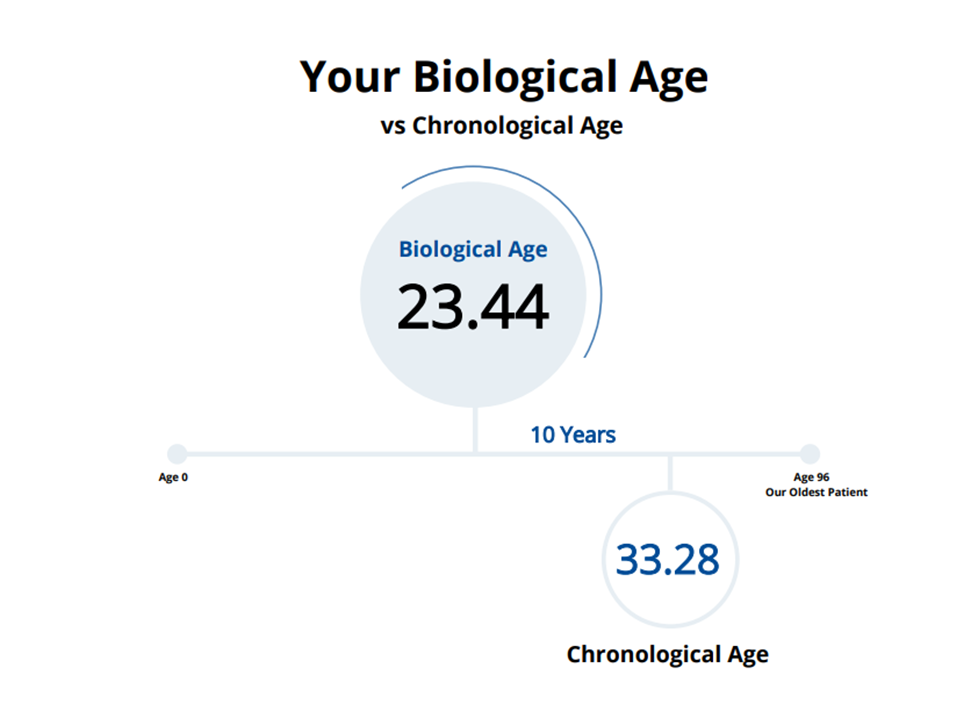
Unlike chronological age, Biological Age measures how effectively the body functions. It encompasses various factors, such as DNA methylation, lifestyle choices, and environmental influences. This age measurement is derived from statistical research and provides a valuable framework for comprehending an individual’s health status and mortality risk.
Ideally, everyone would want their biological age to be younger than their chronological age. This means that they are living a healthy lifestyle that will help them stay healthy and prevent sickness and disease for a longer period of time. Great news awaits! The realm of epigenetics brings hope as it unveils the reversibility of epigenetic changes, including DNA methylation. Yes, you read it right – epigenetic aging is reversible. Now, armed with a direct measure of aging, we hold the key to slowing down the relentless march of biological aging!
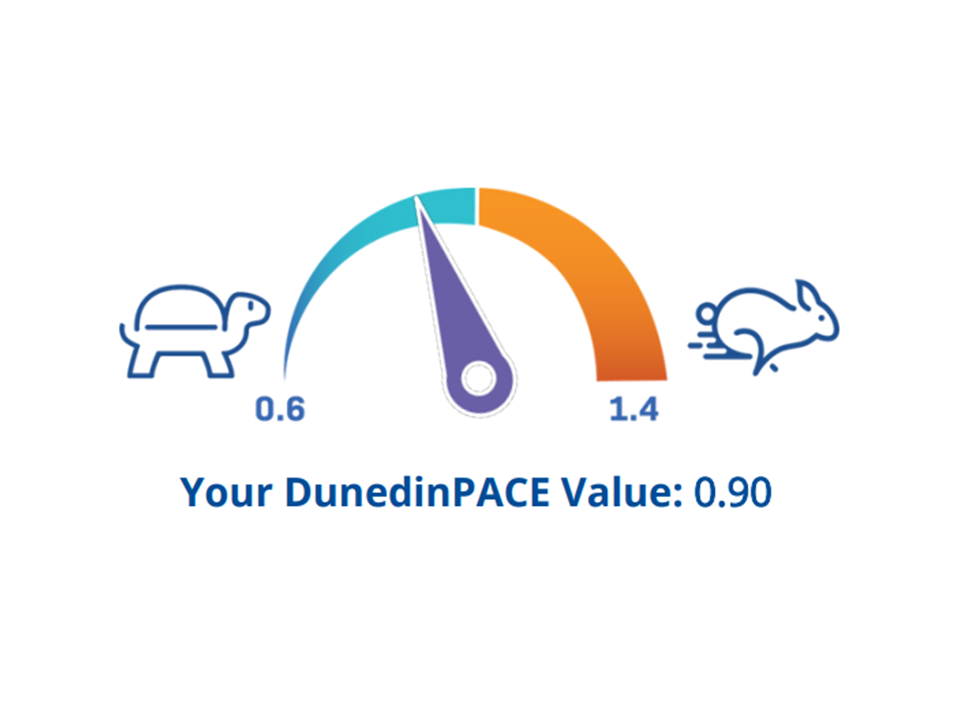
Your Pace of Aging (DunedinPACE) Value represents how many biological years you are aging per year at the precise moment. It distinguishes your current actions from the markers you have accumulated from your past or inherited from your ancestry. An average person will age at a rate of 1.0 biological years/1.0 years of chronological aging. The fastest pace of aging measured thus far is 1.4 biological years/1.0 years of chronological aging. The slowest pace of aging measured thus far is 0.6 biological years/1.0 years of chronological aging. It is desirable to have a pace of aging that is less than 1.
Pace of Aging typically increases across much of the adult lifespan. A faster DunedinPACE is the result of lifetime stress-induced DNA methylation changes. Greater exposure to stress, tobacco smoke, diseases, and lower-quality nutrition is linked to an accelerated DunedinPACE.
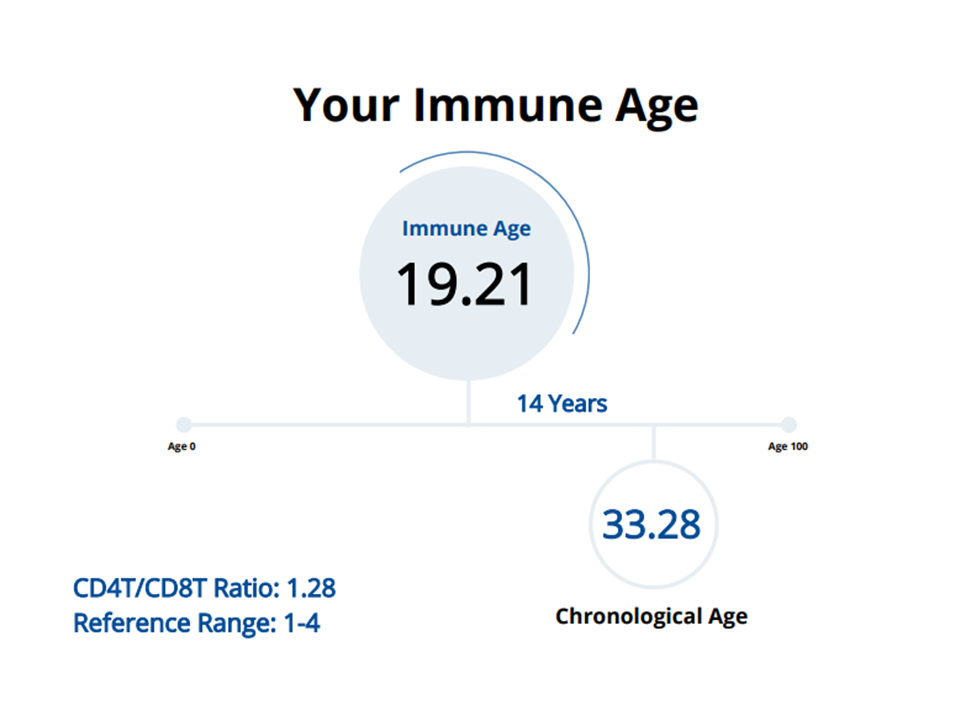
Think of Immune Age as a measure of your immune system’s strength. Have you ever wondered why older individuals are more susceptible to illnesses like COVID-19 and the flu? It’s because the immune cells necessary for a robust response tend to decrease as we age. This decline in immune function, known as Immunosenescence, is a normal part of the aging process.
Immune Age serves as a surrogate indicator for the immune system and has the potential to predict the composition of your immune cells. A higher Immune Age compared to chronological age may signify that your immune system is not functioning at its highest potential.
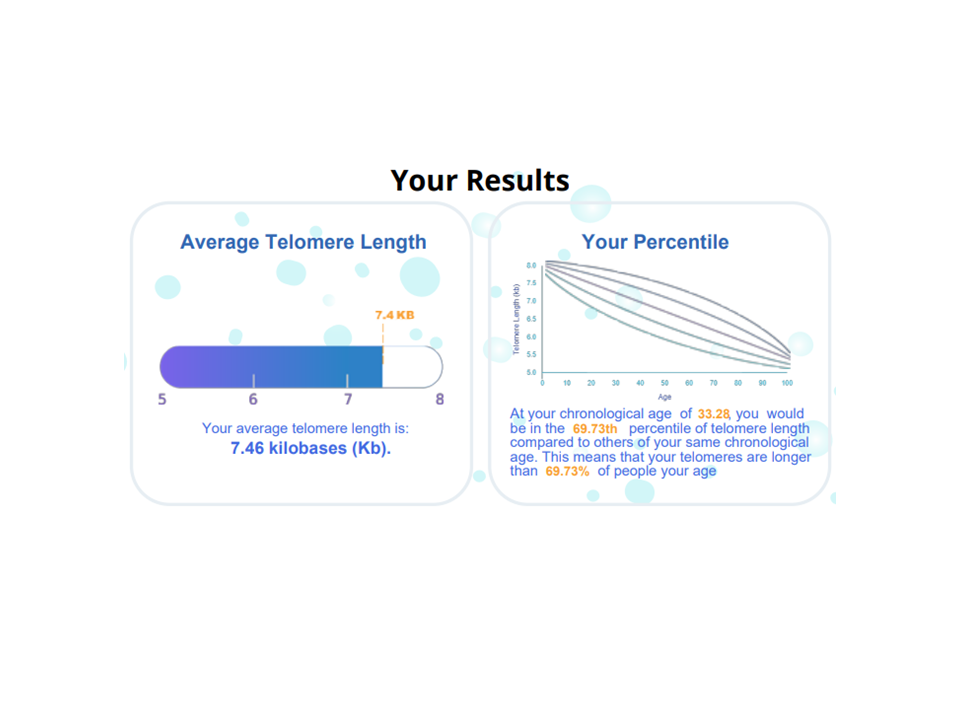
Telomeres, integral components of human cells, exert a profound influence on cellular aging. The length of telomeres has emerged as a critical factor in determining replicative senescence and cell destiny.
Extensive research indicates a correlation between cellular aging, shortened telomere length, and reduced telomerase activity in numerous preventable chronic diseases. These chronic diseases include hypertension, cardiovascular disease, insulin resistance, type 2 diabetes, depression, osteoporosis, and obesity. Additionally, shorter telomeres have been linked to genomic instability and the development of cancer. Older individuals with shorter telomeres face a three to eightfold heightened risk of mortality from heart and infectious diseases compared to those with normal telomere length. Acquiring knowledge about telomere shortening rate and length is therefore vital for individuals, as it can significantly impact their health and rate of aging, empowering them to proactively collaborate with healthcare providers in disease prevention.
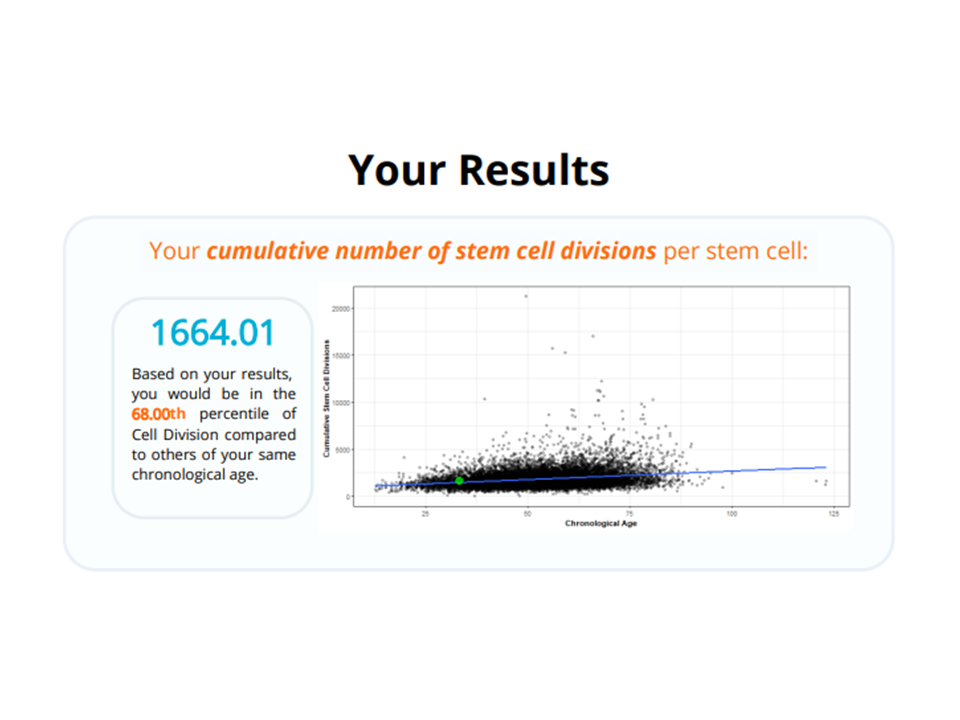
Monitoring cell replication (cell turnover) plays a crucial role in understanding tissue dynamics, aging, and disease progression. Epigenetic-based Mitotic Clocks, which measure the rate of cell turnover through DNA methylation, provide valuable insights into these processes.
Stem cells play a crucial role in replenishing and replacing damaged or aging cells in our bodies. However, it’s worth noting that stem cells have a limited number of division cycles. Once they have undergone a certain number of divisions, they cease to divide and eventually die. Consequently, a high DNA Methylation Mitotic Clock number may indicate a depletion in the potential of stem cells.
When an individual undergoes stem cell treatment, their DNA methylation mitotic clock may display a lower number compared to if they had not received treatment. This is because the injected stem cells are typically younger than the existing cells in the body, and the rate of division may be higher due to their increased activity.

Weight loss can pose a significant challenge for individuals who have been overweight for an extended period. The response to weight loss therapy varies from person to person. While a hypocaloric (calorie-deficient) diet is often recommended for weight loss, the outcomes can differ among individuals. This is because there are molecular and epigenetic factors influencing how the body responds to calorie deficit.
Understanding your body’s specific response to calorie deficit is crucial for tailoring a personalized weight loss therapy. This report helps identify your personal weight-loss response to caloric restriction, enabling the customization of a plan that suits your individual needs and characteristics. By knowing how DNA Methylation influences your response to calorie deficit, you and your healthcare provider can determine the best interventions for your weight loss journey.
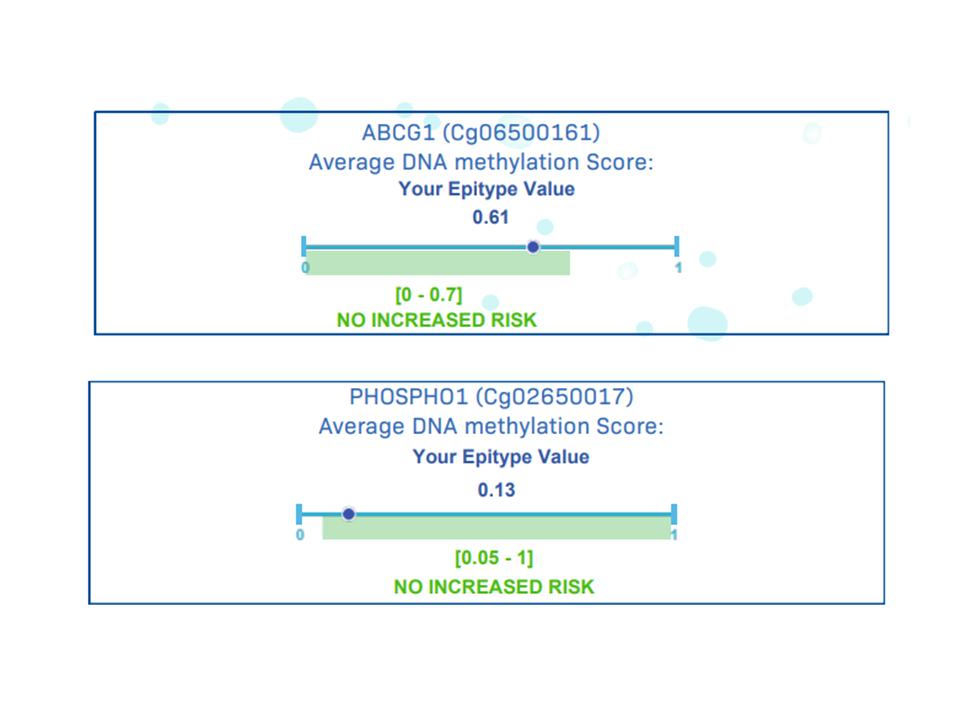
Various genetic and non-genetic factors have been identified that contribute to an increased risk of T2D. The good news is that adopting a healthier lifestyle, including proper diet and exercise, has the potential to reduce the risk of T2D by nearly 50% among high-risk individuals.
As a result, there is a strong interest in identifying individuals who are at a high risk of developing T2D.
Unlike the DNA sequence, epigenetic profiles such as DNA methylation, can be influenced by environmental factors and have the potential to improve T2D prediction. Recently, an epigenome-wide association study identified 5 DNA methylation loci in the blood that were associated with T2D, including ABCG1 and PHOSPHO1. In this test, methylation scores combining the results from these 2 methylation loci predict the risk of prospective T2D occurrence.